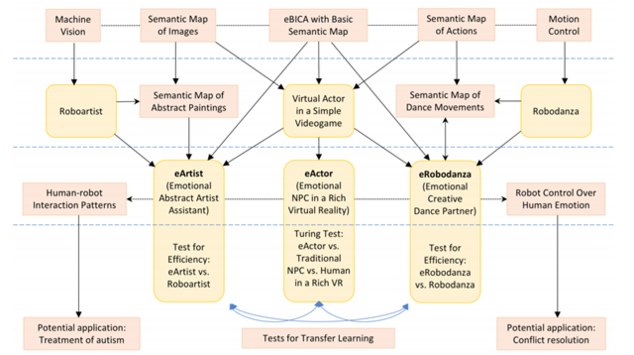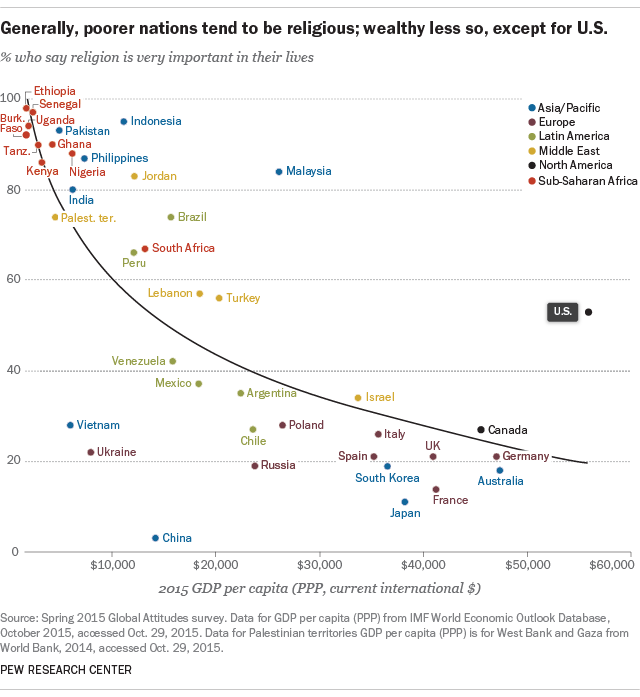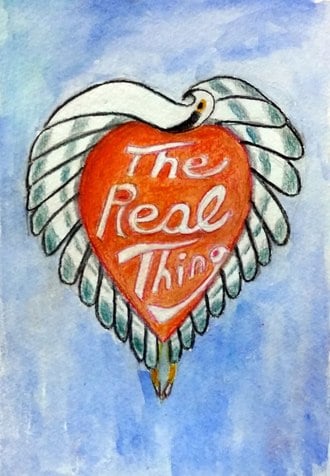Comments
-
Can God Count to Infinity?Lewis Carroll: "Self-consciousness: beyond the looking-glass and what dogs found there". Inspired some scientists to test dogs for self awareness, but instead of using mirrors they used urine samples from 4 different dogs plus one odorless control, to assess awareness.
all dogs devoted more time to smell the urine samples of the others rather than their own, and this behavior confirmed the hypothesis that dogs seem to know their own smell exactly, they are less interested in their own, and they are therefore self-aware.
Study here

-
Intersubjective consciousnessGot power back on thank you FP&L.
I thought about Interventions when I read MU's post. How people who got sucked into a cult, were then abducted, restrained, by those concerned, and set upon by the conscious deconstruction of their belief patterns. A brainwashing or a kind of spiritual gang rape.
The Lapland study suggests that they use drugs as necessary, which was in the minority (30% ?) of the cases. There is a difference between a functional disorder which may be treatable and a physiological disorder which may be only treatable by some regime of medication. Apparently small physiological disorders are not the uncommon, but our brain is plastic enough to wire around them.
Approximately 1 in 5 adults in the U.S.—43.8 million, or 18.5%—experiences mental illness in a given year.
Approximately 1 in 25 adults in the U.S.—9.8 million, or 4.0%—experiences a serious mental illness in a given year that substantially interferes with or limits one or more major life activities.
Approximately 1 in 5 youth aged 13–18 (21.4%) experiences a severe mental disorder at some point during their life. For children aged 8–15, the estimate is 13%.
The doctors in Lapland have established procedures, which are meant to sort things out from the start. They attempt to position the patient for the best outcome, whether that is in a hospital or not, and they have 30 years experience doing this with apparently very good results. Their methods suggest that people have a strong inclination to participate in solving their own mental problems in cooperation with a group which is not hierarchical structured, but gives them say in their treatment, a group they can trust.
A child identifies with its mother (or surrogate) until approximately 1 year old or perhaps even earlier. I think that the child's physical separation from the mother (she has to get back to work or something similar) generally coincides with the child's separation of itself from the world and its obtainment of self awareness. Where self awareness is thought of as a functional process of consciousness. The child also picks up language around this period, which enable it to identify and differentiate internal and external perceptions. The child learns to associate words with what they signify, and eventually they learn the arbitrary nature of words. I think this learning becomes the basis of a child's value system, where the child's immediate context, the inter subjective roles they learn have a direct impact on the meanings the child associates with its experiences, a process which evolves as the child develops. Perhaps the Laplanders are able to tap into a similar process, in the development of their patients.
The doctors in Lapland are skilled at handling patients who have lost their way mentally, they work with the patient as part of team, in which the patient particulates in the outcome. My guess is that the doctors are able to help their patients by tapping into the power of their combined group effort. They indicate that they have had setbacks, but their 5 year stats were pretty good.
Unlike the cult prisoner, the Laplander's patients either asked for help or a family member of the patient asked for them, Unlike the reasoned arguments of the deprogrammer, the therapists in Lapland seem to be able to bring the patient into their process as an equal participant to create pragmatic new meanings that enable the patient to live a normal life. -
Intersubjective consciousness
Sorry, can't participate in conversation... Irma done me wrong.
[jumping on plane Friday to Portugal get the hell out of Florida it's way too hot with no AC].
The "I", "me" distinction is based on William James discussion namely ‘I’ (self-as-knower) and ‘Me’ (self-as-known) -
Post truthIn the span of 48 hours, Trump cut a deal with Democrats to keep the government funded and raise the nation’s borrowing authority, advanced talks with the senior Senate Democrat on a permanent debt ceiling solution and followed the advice of the top House Democrat, who urged him to use Twitter to ease the fears of young undocumented immigrants.
He is questioning the GOP's basic presumptions such as there has to be a debt ceiling, following his own logic, not listening to what his advisers have to say. I think for him it's more a question of 'let's make a deal' , and he has been stymied at each point by the rather stark polarization between the GOP and the DEMs. Being able to agree with DEMs on certain critical issues means he can get legislation passed, because the GOP are trained from birth O:) to follow the leader.
The GOP will have to get used to this alternative fact. -
Intersubjective consciousness
There is a way to think of this as a narrative process starting with the initial narrative we tell our selves, the difference between "I"(Author) and "me"(Narrative). This initial differentiation gets the ball rolling. My social construct has to be related to that social group with whom I am most closely associated. The social constructs I make for myself are based on the relational parts of close social networks. I think we assume roles from the context we develop in, male, female, animal, environmental, economic .... this process of creation of narratives goes on through out our lives.
The open dialogue method utilizes a dialogic circle , in which values and new(I think the values and meanings which are developed are new in a way similar to how two narrative can be combined to form a new narrative) meanings can be co-created. Not so much causal, but a system of relationships: a's act affects b, which affects c and changes its relationship with a. I think it is metonymic; how closely related, but separate parts are related,
The therapists and their assistants do not try to change anyone's mind. The do not try to instill more normative thoughts, rather their effort is to assist the patient's dialogic circle to construct new pragmatic narratives, that enable the patient to see new possibilities from within their circle, values that pragmatically change meanings for the patient.
One of the differences in thinking about the dialogic process as a narrative is the need for an author in the narrative approach, A dialogic circle as a dynamic social system which does not need any author. Much of the Laplander's efforts can be seen as an attempt to get away from any hierarchical structure in therapy. which is why I suspect for the people up in Lapland the person who takes the initial phone call becomes responsible for the case. -
The society depicted in Kubrick's Eyes wide shut
I think the action in EWS is presented as linear, but it is actually a reenactment, which only becomes evident as the story progresses. I think something of this sort explains what occurs, what is going on in EWS.
The main character, Bill, is recounting his fantasy to Alice after she shares hers with him and we are experiencing his fantasy unravel as if were reality.
Alice's desire for the Naval Officer, (semen?). A man in a uniform (authority), a fantasy that drives her wildly horny, which she can only satisfy with Bill (love) . They play a drugged truth game which forces Bill's fantasy out in the open.
If this is possible, then Alice is Marion, Domino, and the lady at the orgy in Bill's fantasy. This may explain the incredible coincidence of events and their equally amazing refutation a day later. -
Intersubjective consciousness
Of course if the notion of a shared inter-subjectivity implies the co creation of new shared reality (a third kind), as integral, then unconsciously our relationships must also develop a third kind, perhaps as our automatic, unconsidered reactions in our relationship with others.
Interesting academic article. Sounds like their methodology has been very successful and they are now seeking to ground it in a model (I like M Bakhtin and Lacan). -
Intersubjective consciousness
I liked their program very much. It suggests to me that communication is more than the exchange of information. That in communication the language used also reflects the constitution of the individual, that the individual is shaped by the language they use.
The structure of the Oedipal Complex is sometimes a useful frame of reference, but it is simply a structure for classification, it does not constitute the individual in whom it is manifest. The people in the film suggest that the power relationship in a group which includes the person requiring help and those trying to help is much stronger than I thought.
My guess is that the power of inter-personal relationships enables the results these doctors are getting. Clearly they are skilled and experienced with what they do, but their ability to transfer the patients's problems into a group dynamic enables them to achieve the high level of their results. They convert the way a person thinks about themselves by means of their equal status in their conversation.
Their method overcomes one of the central issues in talk therapy, the power of the analyst over the patient, where the patient looks to the doctor to come up with all the answers. The patient must change their way of thinking and talking about themselves, not as the product of an interpretation, but as part of their interpretation of themselves.
I don't know how hard or easy it would be to replicate their methods in larger areas, such as the US. I can't remember the last time a doctor came out in 24 hours to the home of a patient. That kind of medical service seems like something from many years ago.
Too bad they could not share an actual session with a patient. -
Taxation is theft.Just taxation requires a moral theory of justice.
All cooperative societies have costs or expenses. How these costs and expenses are to be justly distributed over a population is the question of taxation.
Rawls "Theory of Justic" general rule:
"All social primary goods-liberty and opportunity, income and
wealth, and the bases of self-respect-are to be distributed equally
unless an unequal distribution of any or all of these goods is to the
advantage of the least favored."
Taxation is a moral claim on this view. The sacrifice of income (tax) is necessary for maintaining a just society that is fair to both the most successful and the least successful in a society. -
The Robot Who was Afraid of the Dark
Yes, did you catch Elon Musk's tweet from yesterday?
China, Russia, soon all countries w strong computer science. Competition for AI superiority at national level most likely cause of WW3 imo.
5:33 AM - Sep 4, 2017
He and 116 other international technicians have asked the UN to ban autonomous weapons, killer robots. UK has already said it would not participate in ban....and I am sure that US, China, Russia and others will also not participate in ban. -
The Robot Who was Afraid of the DarkI am certainly no expert, that is why I referenced the article and short 7 page paper written by people who have a much better understanding.
-
The Robot Who was Afraid of the DarkHere is a road map for an emotional, creative, social, AI.

Military applications are frightening,
Article about this appeared in today Bloomberg.
https://www.bloomberg.com/view/articles/2017-09-05/take-elon-musk-seriously-on-the-russian-ai-threat -
The society depicted in Kubrick's Eyes wide shut
Yes, I think the end of the film brings home the point that dream like experience they just went through may have been more fantasy than reality, it made them question reality and their fantasies which is what conspiracy does, they wake up at the end breaking the trance "We're awake now".
-
The society depicted in Kubrick's Eyes wide shut
Conspiracy theories were big back then, especially ones tied to together with the occult, sex, religion. (I especially like Roman Polanski's "The Ninth Gate"). The following video takes the view that the movie is more about the viewer's perspective, it also has a good overall summary of the movie.
-
Has Evangelical Christianity Become Sociopathic?Yes, my point is he could have said it, meaning to sell the 'pursuit of happiness' as a way of life, the sizzle, instead of ownership of property, the steak.
-
Has Evangelical Christianity Become Sociopathic?It is my understanding that when Thomas Jefferson was working on the Declaration of Independence, he had first written "life, liberty, and the pursuit of property" (Locke's big three). I think it was Benjamin Franklin who suggested 'happiness' instead of property.
Yes, that's also what I understand.
"Sell the sizzle and not the steak" is often attributed to Ben Franklin. -
Has Evangelical Christianity Become Sociopathic?
The US may have a very high level of GDP, but very large numbers of Americans (as a group and individually) have a very small share of that largesse. A lot of Americans are both relatively and actually poor, so the correlation holds between poverty and religiosity.
The information is presented on a capita basis in order to compare it to other nations, but as you indicate it can be skewed. Pew found no hard correlation between the level of income and religiosity, but in general the poorer the nation the more likely it is religious, except for the US.
As presented 53% of US population said religion is very important in their lives, the poverty level in US is 14.3% of the population which means that the 38.7% of those who live above the poverty level in the US also believe that religion is very important in their lives.

-
The pros and cons of president TrumpAnother is that politics should clearly represent the interests of its constituencies. This may never have been true, but it certainly is not true now. Instead, politics (parties, candidates, conventions, campaigns, official and unofficial congressional activities, etc.) misrepresent and subvert its constituencies' interests.
I think we see politicians keeping strictly to party lines, even when the party's lines may not represent the interests of a given constituency. This is true of both parties, and it flows from local politics to national politics. If you want to get ahead, and become reelected you must tow the party line or else.
Very few representatives are willing to risk the disfavor of their Party:
The Trump administration is reportedly warning of possible repercussions for Alaska after Sen. Lisa Murkowski's (R-Alaska) votes on healthcare.
Trump tweeted:
Senator @lisamurkowski of the Great State of Alaska really let the Republicans, and our country, down yesterday," Trump tweeted. "Too bad!"
Standing up for your constituency may have adverse consequences personally and in the case of Trump it could effect your constituency directly.
Sen. Dan Sullivan (R-Alaska) said Zinke's message was "troubling."
"I'm not going to go into the details, but I fear that the strong economic growth, pro-energy, pro-mining, pro-jobs and personnel from Alaska who are part of those policies are going to stop," Sullivan said.
This is sad. -
Where do I fit in regarding hate and forgiveness?
Plato argues in his "Gorgias" that it is better to suffer wrongs than it is to cause them, that a person who causes harm is to be pitied, because the spiritual harm which an evil person does hurts themselves more than the harm they do to the others.
In reading your example I kept thinking about Sheriff Joe Arpairo of Arizona, who was recently convicted of criminal contempt of court. He was scheduled to begin a 6 month prison term in October but he was just pardoned by President Trump.
If I were one of the people who had been wronged by Sheriff Arpaio, whose racial profiling was inordinately anti-Mexican I would be very upset that he escaped justice, by the President's right of pardon. Plato's suggestion is that Arpaio does not escape justice, rather that his injustice, which was not punished, festers in his spirit, that he cannot forgive himself and he ought to be pitied as an evil, mean spirited person. -
Gettier's Case II Is Bewitchment
Belief can be wrong....is the cup in the cupboard?. Reality and logic are not joined at the hip but they are generally pretty friendly. -
What is the ideal Government?
Naa man, lets like, make, like, ... Elon Musk the God Emperor of all mankind!
Tut, tut, :)
Justice by fiat is not just, it is arbitrary, a secularized form of divine command theory. -
What is the ideal Government?
A monarch, who, unlike a democratically elected leader, is there for life, and hence doesn't have to take decisions for the short-term so that he gets elected the next time around, but can rather take the decisions required to maintain the stability of his country so that he can leave his country in a good state, and pass it on his descendants.
A monarch who is above the law is a sad conception. The justice of a tyrant can never, in principal or in fact can be just or fair, even when the it does social good. I think this conception is derivative from the absolute program of religions which are all about the existence of God on earth. -
What is the ideal Government?
Policies don't make a democracy, the ways those policies are made make a democracy or a dictatorship
Yea, I agree with that in a democracy policies are inclusive, they apply as much to those in power as they apply to those who are powerless. There is no one or group above the policies that people have constructed as policy and they have accepted. Justice as a value, is only possible in a democratic form of government. -
What is the ideal Government?
I shall, a right is something that a person is entitled to no matter what.
A right is not only meant to protect them but also give them a decent standard of living.
A right is also supposed to restrict people from taking certain actions.
The state must make sure these rights are upholded.
An example of an undeniably important right is the right to life, or the right not to be murdered.
I take a slightly different view. I think rights must be good, derivative of what is just and fair which are incorporated into legitimate practices, not just ideals (Plato). Justice is a value which is only available in a democracy, a way to make relationships between men un-arbitrary. -
How do I find my purpose for life?I didn't take it as anti-gay, particularly, but I find the idea of people having children in order to find a purpose in life a little disturbing. It's asking a lot of one's children to make your (parental) life purposeful.
I know this is not quite what you are saying here but I've known several people for whom family is their life, and their purpose in life. -
What is the ideal Government?
This is a conversation, not an interrogation and as such you ought to contribute to it. -
What is the ideal Government?
I'm asking you to give examples of laws.
Civil, criminal, international, municipal laws?
Not really very sure what you are asking? Laws typical protect freedoms, rights such as those outlined in the Bill of Rights here in US...freedom of speech, right to protect oneself, to petition....
I think a democratic government is superior because it ideally able to address issues justly/fairly for the majority of the most diverse segments of a population, those who are advanced, the elite in society as well as the most needy, the destitute and poor in society. -
What is the ideal Government?
All democracies are constituted by laws, both traditional like English Common Laws and by laws that have been constructed, by statute. Or are you now asking for the purpose of laws? To my mind the laws that constitute a government circumscribe a normative morality, a sense of fairness, and not the other way around. -
What is the ideal Government?
If democracy was not the best form of government then you guys would be mentioning other forms of government, I think. As far as the best example of a democratic form of government, it would be the one which is fair to all citizens. ruled by laws, and legitimately reflective of its population's will. -
What is the ideal Government?
Don't patronize me, you can look it up. The OP asked for the best form of government and I think it is a democratic one. Like I said if you think there is a better one then out with it. -
What is the ideal Government?
There are currently 123 democracies in the world of all 192 countries.
I am thinking of democracy as an ideal form of government, not any specific specimen, and again one where rule of law, justice and legitimacy are apparent. Can you suggest a better one? -
What is the ideal Government?Some form of democracy, which is ruled by laws, and is just and legitimate.
-
A Question About World PeaceThere is probably no way for long lasting peace on earth. However, the world could and should strive to be more peaceful with fewer wars.
I think that it is instructive that the more athestic a society the less warlike it is.
The GuardianSociologist Phil Zuckerman summarizes their results in his new book Living the Secular Life:
...according to their most recent rankings, among the top ten most peaceful nations on earth, all are among the least God-believing – in fact, eight of the ten are specifically among the least theistic nations on earth. Conversely, of the bottom ten – the least peaceful nations – most of them are extremely religious.
I think if a world of just atheists were possible, it would be necessarily more peaceful than the current world, (look at the history of Religion) because it would not be tied to an autocratic, absolutist ruler. The same goes (& they seem very close) for any absolutist attempt to have a classless society, such as Stalin.
Cavacava
Start FollowingSend a Message
- Other sites we like
- Social media
- Terms of Service
- Sign In
- Created with PlushForums
- © 2026 The Philosophy Forum

